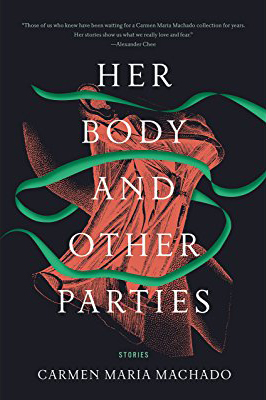Carmen Maria Machado's “In the Dream House” is a highly inventive memoir which primarily focuses on a past abusive relationship and the effects of it. Part of what drew me to reading this book was a curiosity to see how she'd meld her fantastical style of writing - which she displayed in her excellent short story collection “Her Body and Other Parties” - with her own autobiographical experience. In this book there are many straightforward recollections of her past particularly concerning an abusive relationship. But they're all framed within the idea of a dream house that was formed within this intense romance. Like a fairy tale castle this imagined space becomes the central setting of fantasy, pleasure and horror. And through this Machado considers different tropes found in folk literature and how they sync with the trajectory of her own turbulent love affair.
What makes this so effective is it shows the author's own meaningful influences from literature to queer theory to the history of domestic violence and references to films such as Gaslight and Stranger by the Lake. Through her intelligent analysis and personal interpretation of these we feel how deeply traumatised she's been by this relationship. It's possible to get an idea of an abusive relationship from details such as threatening phone calls or bodily harm, but it's much harder to convey the intensely conflicted feelings of fear, shame, lust and love which accompany these events. Machado has found a method to do this which is unique to her sensibility and which fully shows the reader all the ambiguities of her experience.
It's interesting how she chooses to primarily narrate this memoir through the second person. Fairly early on there is a switch from speaking about her past in the first person to describing it using the pronoun “you” which suggests a more analytical way or looking at her own experience as well as inviting the reader to imagine themselves in her shoes. I felt this was impactful in showing moments of realisation and perspective: “though it would not be until the next summer solstice that you’d be free from her, though you would spend the season’s precipitous drop into darkness alongside her, on this morning, light seeps into the sky and you are present with your body and mind and you do not forget.” In writing “you” the reader understands there is a mindfulness about how she realised this situation was not right, but she was nonetheless unable to free herself from it at the time.
In Meena Kandasamy's powerful novel “When I Hit You” about an abusive marriage, she observes how the shame is not always in the abuse itself but in having to stand to judgement after leaving that relationship. Machado is similarly aware how people will question what is considered abuse and she meaningfully explores how this is further complicated by it being a same-sex relationship. As she found when doing research, there are precious few accounts of domestic abuse in lesbian relationships or between other queer couples. This memoir is not only an important testimony to add to these seldom-recorded histories, but it's also an emotional and thoughtful examination of why so few exist.









